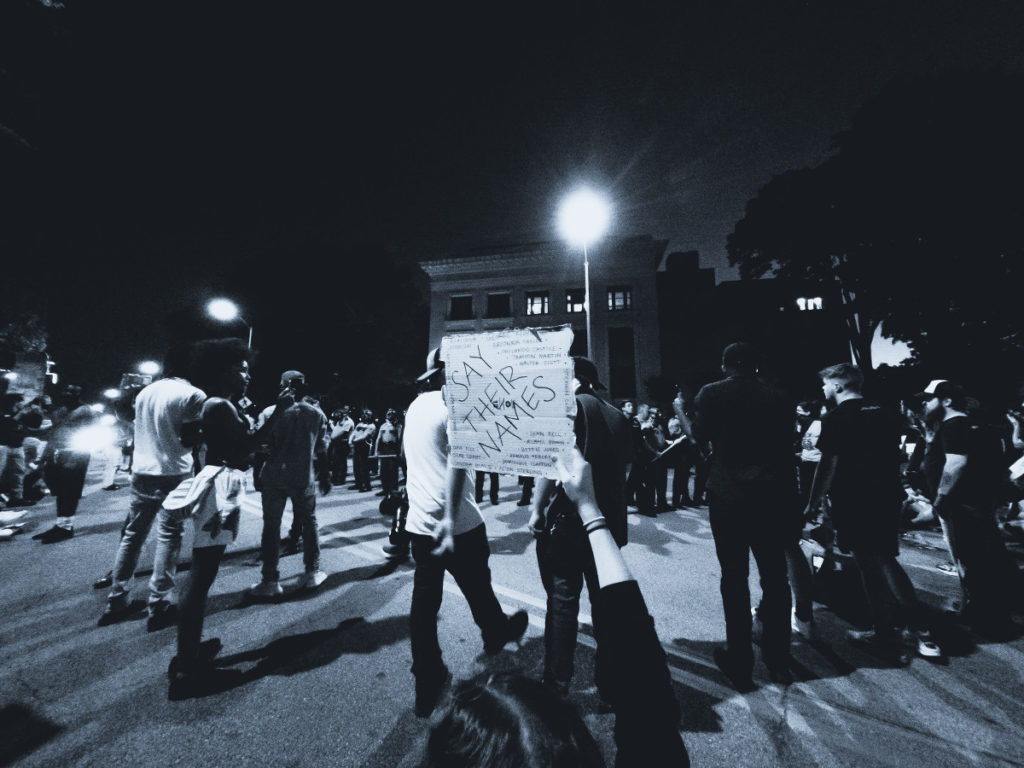Watching the news with a heavy heart these last several weeks has left me struggling for words with which to continue the dialogue about racial prejudice with my daughter. Yes, I recognize the privilege inherent to that statement. I choose when to talk about a subject that many other families of color must address far earlier and far more often. But I recognize that we can’t stop when the protests do—that just means nothing will change.
In the last couple of weeks, I’ve learned about the Oklahoma Race Riots and added Emmett Till’s name to the heartbreaking list of victims that include too many names, including Trayvon Martin, Breonna Taylor, and George Floyd. I’ve watched protesters beaten, teargassed, and shot with rubber bullets. I’ve listened to protesters who’ve offered their voices to history. I’ve read about the migration of African slaves to India and how their social status evolved so differently than in the United States. My education still has a long way to go.
When protestors passed along our street, visible and audible from our house, when the couple next door celebrated their birthdays this weekend and she tagged her husband’s birthday photo with #HisLifeMatters, the reminders struck home and indicated that the violence and brutality being protested affect people that I don’t regard as any different from me. After all, our children play together, we celebrate together, and we hang out with each other. With friends of different backgrounds all over the world, I’ve paid extra attention in the last few weeks to the posts of my friends who happen to be black, determined to empathize and do better for my children and theirs.
My daughter’s school has impressed me with their willingness to introduce topics of racial discrimination far earlier than I remember learning about them. Ruby Bridges and George Washington Carver were two heroes they learned about in Social Studies this year. T brought home the children’s book, “Hidden Figures,” and we’ve read it together and discussed it. With her ongoing fascination with space, these were women she already admired. The idea of segregation is so unbelievable to her that I have hope for the future, that we will one day truly only judge one another by the content of our character.
I’ve got more books coming, too, both for me and for the kids. The news cycle and our go-to comedic entertainers have brought light to topics that spurred discussion at home. I even found another way the events of today are inextricably tied to my own past.
I didn’t know why my family chose to immigrate from India to the US in the mid-60s. I always believed that it was their way of pursuing the American Dream, just as I always believed that the American Dream was always within grasp for everyone. The events of the last few weeks, the proof in the statistics, the buried horrors of this country’s past now being broadly shared, and the quickness of many people to lump peaceful, lawful protesters with opportunistic looting criminals all illuminate my naïveté.
Before this past week, I didn’t know that the early civil rights movement had anything to do with me, only that I benefited from it much later. However, the 1965 immigration law overhaul meant that my parents could immigrate here and that I would later be born on American soil, a citizen with the “model minority” stamp of approval that has backed so much of my success. Where would I be, if not for the women of color—many of them black—who came before to pave the way for my education and employment?
My husband and I have been talking about our admittedly few experiences with the police. I recounted my experience being driven to school in a police car after my mom’s car broke down halfway to school. The officers in the vehicle reported me as “a Caucasian female” in their radioed-in status report. It’s been more than 20 years now, but I don’t recall them asking my mother for identification or doing anything other than making pleasant conversation about my academic achievements when they dropped me to school. It seemed like their priority, quite rightly, was making sure that a teenager made it to school on time. Of course, they had to let me out of the back seat, and my friends had a lot of questions that day at lunch.
Mind you, I grew up in Texas and am still regularly addressed in Spanish by people who assume I am Latina because of my coloring. I know black people whose complexions are lighter than my family members’ or mine. Yet these officers described me as Caucasian. Maybe the color of my skin didn’t matter to them or to their report. In the context of what’s happening today, I can’t help but wonder how differently our conversation might have proceeded if they instead assumed I was black or Latina. In a perfect world, the conversation would have gone exactly the same. In the real world…I’m not so sure anymore.
A few years ago, we had a police officer show up on our doorstep vehemently asking for a particular person in connection with a warrant. My husband answered the door and calmly explained that the person did not live at this address and to his knowledge did not live in our neighborhood. After reiterating this fact to the increasingly irate police officer, K convinced the officer to review what little paperwork there was, only to discover that he was seeking a different address a few doors down.
Should I feel lucky that nothing further occurred, and this officer did not show any force toward my husband? Or should I instead be grateful that the wrong address where the officer appeared belonged to a South Asian family instead of one door over, where a black family lives?

